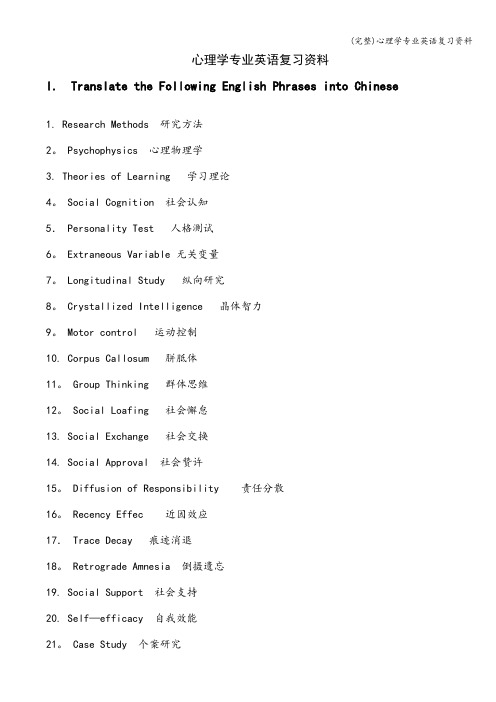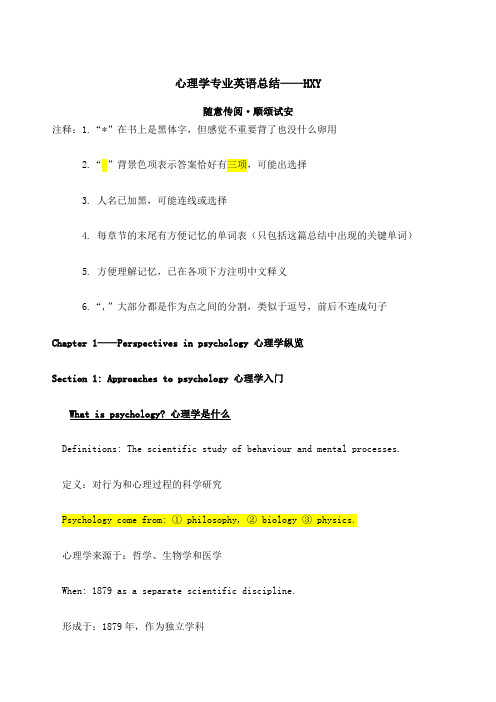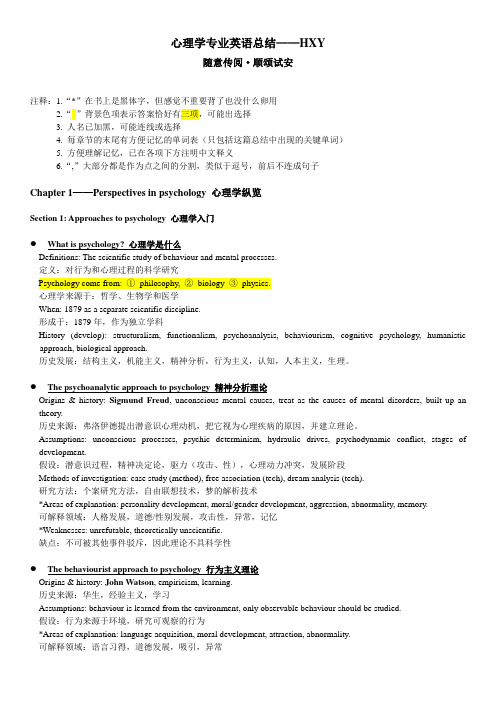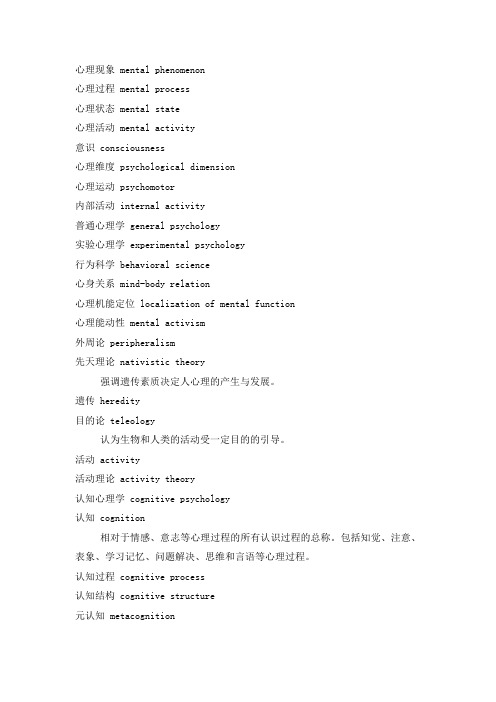心理学专业英语
心理学专业英语

《心理学专业英语》教学大纲王国芳编写应用心理学专业课程教学大纲958 目录前言 (960)chapter 1 PERSPECTIVES IN PSYCHOLOGY (961)1.1 Approaches to psychology (961)1.2 Controversies in psychology (963)1.3 Ethical issues in psychology (964)Reviews and exercises(Answer the following questions in English): (964)Extension readings: (964)Chapter 2 RESEARCH METHODS (965)2. What do psychologists investigate? (965)Reviews and exercises(Answer the following questions in English): (967)Extension readings: (967)Chapter3 COGNITIVE PSYCHOLOGY (968)3.1 Perception (968)3.2 Attention (969)3.3 Memory (969)Reviews and exercises(Answer the following questions in English): (971)Extension readings: (971)Chapter 4 Developmental Psychology (972)4.1 Early socialization (972)4.2 Cognitive development (973)4.3 Later Socialisation (974)Reviews and exercises(Answer the following questions in English): (975)Extension readings: (975)Chapter5 Social Psychology (976)5.1 Social influence (976)5.2 Pro- and anti- social behaviour (977)5.3 Social relationships (978)Reviews and exercises(Answer the following questions in English): (979)Extension readings: (979)Chapter 6 Comparative Psychology (980)6.1 Reproductive Strategies (980)6.2 Kinship and social behaviour (981)6.3 Behaviour analysis (982)Reviews and exercises(Answer the following questions in English): (982)Extension readings: (983)Chapter7 Biopsychology (984)7.1 Cortical functions (984)7.2 Awareness (985)7.3 Motivation and emotion (986)Reviews and exercises(Answer the following questions in English): (987)心理学专业英语Extension readings: (987)Chapter8 Abnormal psychology (988)8.1 Conceptions of abnormality (988)8.2 Psychopathologies (989)8.3 Therapeutic approaches (990)Reviews and exercises(Answer the following questions in English): (991)Extension readings: (991)959应用心理学专业课程教学大纲960前言《心理学专业英语》是应用心理学专业的一门专业方向必修课,授课时间为一个学期 36 学时,修 2 学分。
(完整)心理学专业英语复习资料

心理学专业英语复习资料I. Translate the Following English Phrases into Chinese1. Research Methods 研究方法2。
Psychophysics 心理物理学3. Theories of Learning 学习理论4。
Social Cognition 社会认知5. Personality Test 人格测试6。
Extraneous Variable 无关变量7。
Longitudinal Study 纵向研究8。
Crystallized Intelligence 晶体智力9。
Motor control 运动控制10. Corpus Callosum 胼胝体11。
Group Thinking 群体思维12。
Social Loafing 社会懈怠13. Social Exchange 社会交换14. Social Approval 社会赞许15。
Diffusion of Responsibility 责任分散16。
Recency Effec 近因效应17. Trace Decay 痕迹消退18。
Retrograde Amnesia 倒摄遗忘19. Social Support 社会支持20. Self—efficacy 自我效能21。
Case Study 个案研究II. Translate the Following Chinese Word Groups into English1。
机能主义 functionalism2。
自我实现 self—actualization3.一般规律研究法 nomothetic method4。
分层抽样 stratified sampling5. 外在信度 external reliability6. 选择性注意 selective attention7。
知觉恒常性 perceptual constancy8. 自我概念 self concept9. 液体智力 fluid intelligence10. 安全型依恋 secure attachment11. 性别图示 gender schema12。
心理学专业英语总结完整

心理学专业英语总结——HXY随意传阅·顺颂试安注释:1.“*”在书上是黑体字,但感觉不重要背了也没什么卵用2.“”背景色项表示答案恰好有三项,可能出选择3. 人名已加黑,可能连线或选择4. 每章节的末尾有方便记忆的单词表(只包括这篇总结中出现的关键单词)5. 方便理解记忆,已在各项下方注明中文释义6.“,”大部分都是作为点之间的分割,类似于逗号,前后不连成句子Chapter 1——Perspectives in psychology 心理学纵览Section 1: Approaches to psychology 心理学入门What is psychology? 心理学是什么Definitions: The scientific study of behaviour and mental processes.定义:对行为和心理过程的科学研究Psychology come from: ① philosophy, ② biology ③ physics.心理学来源于:哲学、生物学和医学When: 1879 as a separate scientific discipline.形成于:1879年,作为独立学科History (develop): structuralism, functionalism, psychoanalysis, behaviourism, cognitive psychology, humanistic approach, biological approach.历史发展:结构主义,机能主义,精神分析,行为主义,认知,人本主义,生理。
The psychoanalytic approach to psychology 精神分析理论Origins & history: Sigmund Freud, unconscious mental causes, treat as the causes of mental disorders, built up an theory.历史来源:弗洛伊德提出潜意识心理动机,把它视为心理疾病的原因,并建立理论。
心理学专业英语总结(完整)

心理学专业英语总结——HXY随意传阅·顺颂试安注释:1.“*”在书上是黑体字,但感觉不重要背了也没什么卵用2.“”背景色项表示答案恰好有三项,可能出选择3. 人名已加黑,可能连线或选择4. 每章节的末尾有方便记忆的单词表(只包括这篇总结中出现的关键单词)5. 方便理解记忆,已在各项下方注明中文释义6.“,”大部分都是作为点之间的分割,类似于逗号,前后不连成句子Chapter 1——Perspectives in psychology 心理学纵览Section 1: Approaches to psychology 心理学入门●What is psychology? 心理学是什么Definitions: The scientific study of behaviour and mental processes.定义:对行为和心理过程的科学研究Psychology come from: ①philosophy, ②biology ③physics.心理学来源于:哲学、生物学和医学When: 1879 as a separate scientific discipline.形成于:1879年,作为独立学科History (develop): structuralism, functionalism, psychoanalysis, behaviourism, cognitive psychology, humanistic approach, biological approach.历史发展:结构主义,机能主义,精神分析,行为主义,认知,人本主义,生理。
●The psychoanalytic approach to psychology 精神分析理论Origins & history: Sigmund Freud, unconscious mental causes, treat as the causes of mental disorders, built up an theory.历史来源:弗洛伊德提出潜意识心理动机,把它视为心理疾病的原因,并建立理论。
心理学专业英语词汇

心理现象 mental phenomenon心理过程 mental process心理状态 mental state心理活动 mental activity意识 consciousness心理维度 psychological dimension心理运动 psychomotor内部活动 internal activity普通心理学 general psychology实验心理学 experimental psychology行为科学 behavioral science心身关系 mind-body relation心理机能定位 localization of mental function心理能动性 mental activism外周论 peripheralism先天理论 nativistic theory强调遗传素质决定人心理的产生与发展。
遗传 heredity目的论 teleology认为生物和人类的活动受一定目的的引导。
活动 activity活动理论 activity theory认知心理学 cognitive psychology认知 cognition相对于情感、意志等心理过程的所有认识过程的总称。
包括知觉、注意、表象、学习记忆、问题解决、思维和言语等心理过程。
认知过程 cognitive process认知结构 cognitive structure元认知 metacognition-认知失调 cognitive dissonance认知地图 cognitive map认知技能 cognitive skill认知方式 cognitive style信息 information信息论 information theory信息加工 information processing信息加工心理学 information processing psychology信息加工理论 information processing theory信息加工模型 information processing model中央处理器模型 central processor model信息储存 information storage信息提取 information retrieval人工智能 artificial intelligence, AI计算机类比 computer analogy计算机模拟 computer simulation计算机模型 computer model唯心主义心理学 idealistic psychology意动心理学 act psychology唯意志论 voluntarism唯灵论 spiritualism强调超自然精神作用。
心理学专业英语

Psychological testingPart 1 introductionPsychological testing is the administration of psychological tests, which are designed to be "an objective and standardized measure of a sample of behavior".The term sample of behavior refers to an individual's performance on tasks that have usually been prescribed beforehand. The samples of behavior that make up a paper-and-pencil test, the most common type of test, are a series of items. Performance on these items produce a test score. A score on a well-constructed test is believed to reflect a psychological construct such as achievement in a school subject, cognitive ability, aptitude, emotional functioning, personality, etc. Differences in test scores are thought to reflect individual differences in the construct the test is supposed to measure. The science behind psychological testing is psychometrics.A psychological test is an instrument designed to measure unobserved constructs, also known as latent variables. Psychological tests are typically, but not necessarily, a series of tasks or problems that the respondent has to solve. Psychological tests can strongly resemble questionnaires, which are also designed to measure unobserved constructs, but differ in that psychological tests ask for a respondent's maximum performance whereas a questionnaire asks for the respondent's typical performance.[2] A useful psychological test must be both valid (i.e., there is evidence to support the specified interpretation of the test results[3]) and reliable (i.e., internally consistent or give consistent results over time, across raters, etc.).In a word, the test method is a way to study the law of psychological activities through psychological tests, that is, to collect data by means of a set of standardized questions, according to the prescribed procedures and by means of measurement. Psychological test is a scientific means to deduce and quantify the general law of psychological activities by observing a few representative behaviors or phenomena. First, tests are conducted according to certain standards and procedures rather than subjective experience. Secondly, the test measures human behavior, that is, to measure an individual's behavior according to an objective, standardized procedure. Thirdly, a test generally measures only a part of a person's behavior, but not all of his behavior.Part 2 HistoryThe first large-scale tests may have been examinations that were part of the imperial examination system in China. The test, an early form of psychological testing, assessed candidates based on their proficiency in topics such as civil law and fiscal policies. Other early tests of intelligence were made for entertainment rather than analysis. Modern mental testing began in France in the 19th century. It contributed to separating mental retardation from mental illness and reducing the neglect, torture, and ridicule heaped on both groups.Englishman Francis Galton coined the terms psychometrics and eugenics, and developed a method for measuring intelligence based on nonverbal sensory-motor tests. It was initially popular, but was abandoned after the discovery that it had no relationship to outcomes such as college grades.[8][9] French psychologist Alfred Binet, together with psychologists Victor Henriand Théodore Simon, after about 15 years of development, published the Binet-Simon test in 1905, which focused on verbal abilities. It was intended to identify mental retardation in school children.The origins of personality testing date back to the 18th and 19th centuries, when personality was assessed through phrenology, the measurement of the human skull, and physiognomy, which assessed personality based on a person's outer appearances.These early pseudoscientific techniques were eventually replaced with more empirical methods in the 20th century. One of the earliest modern personality tests was the Woolworth Personality Data Sheet, a self-report inventory developed for World War I and used for the psychiatric screening of new draftees.Part 3 Characteristics of tests◆ 1. According to the explicit behavior of the subjects, infer their internal psychologicalprocess or psychological characteristics, so the psychological and educational test is a scientific research form of "result" for "cause", so it is indirect.◆ 2. relativity. The results measured by the Mental and Educational Test Scale generally reflectindividual differences only from the ranking order. Therefore, scientifically speaking, the results of psychological and educational tests are only a relative quantity, compared with the behavior of the majority of the subjects in the group or some artificially determined criteria.◆ 3. objectivity. Although psychological and educational tests are indirect and relative, theystill have objectivity.Part 4 PrinciplesProper psychological testing consists of the following:●Standardization - All procedures and steps must be conducted with consistency and underthe same environment to achieve the same testing performance from those being tested.●Objectivity - Scoring such that subjective judgments and biases are minimized, with resultsfor each test taker obtained in the same way.●Test Norms - The average test score within a large group of people where the performanceof one individual can be compared to the results of others by establishing a point of comparison or frame of reference.●Reliability - Obtaining the same result after multiple testing.●Validity - The type of test being administered must measure what it is intended to measure.Part 5 Types(1) classification by function.➢ 1.Ability test -- practical ability and potential ability.➢ 2. achievement test - academic achievement➢ 3. Personality test -personality, temperament, interest, attitude and other psychological characteristics(2)Classification by test methodIndividual tests.➢Advantages: it can control the speech and mood and behavioral responses of the subjects. Such➢Disadvantages: time consuming and arduous. The main trial is strict. SuchGroup test.➢Advantages: save time and effort, and collect data in a short time. It➢Disadvantages: it is not easy to control the behavior of subjects, and it is easy to produce errors.(3) Classification by test materials➢Written test (paper and pencil test)➢Non-verbal test(4) Classification by test purposes1.Descriptive test. The purpose is to describe the ability, personality and othercharacteristics of an individual or group.2.Diagnostic test. The purpose is to diagnose a behavioral problem in an individualor group.3.Predictive test. The goal is to predict individual future performance and the levelthat can be achieved.(5)according to the application of the testcation test.2.Career tests.3.Clinical test.◆IQ/achievement testsIQ tests purport to be measures of intelligence, while achievement tests are measures of the use and level of development of use of the ability. IQ (or cognitive) tests and achievement tests are common norm-referenced tests. In these types of tests, a series of tasks is presented to the person being evaluated, and the person's responses are graded according to carefully prescribed guidelines. After the test is completed, the results can be compiled and compared to the responses of a norm group, usually composed of people at the same age or grade level as the person being evaluated. IQ tests which contain a series of tasks typically divide the tasks into verbal (relying on the use of language) and performance, or non-verbal (relying on eye–hand types of tasks, or use of symbols or objects). Examples of verbal IQ test tasks are vocabulary and information (answering general knowledge questions). Non-verbal examples are timed completion of puzzles (object assembly) and identifying images which fit a pattern (matrix reasoning).IQ tests (e.g., WAIS-IV, WISC-V, Cattell Culture Fair III, Woodcock-Johnson Tests of Cognitive Abilities-IV, Stanford-Binet Intelligence Scales V) and academic achievement tests(e.g. WIAT, WRAT, Woodcock-Johnson Tests of Achievement-III) are designed to beadministered to either an individual (by a trained evaluator) or to a group of people (paper and pencil tests). The individually administered tests tend to be more comprehensive, more reliable, more valid and generally to have better psychometric characteristics than group-administered tests. However, individually administered tests are more expensive toadminister because of the need for a trained administrator (psychologist, school psychologist, or psychometrician).◆Personality testsPsychological measures of personality are often described as either objective tests or projective tests.1.Objective tests have a restricted response format, such as allowing for true or false answers or rating using an ordinal scale. Prominent examples of objective personality tests include the Minnesota Multiphasic Personality Inventory, Millon Clinical Multiaxial Inventory-IV,[12] Child Behavior Checklist,[13] Symptom Checklist 90[14] and the Beck Depression Inventory.[15] Objective personality tests can be designed for use in business for potential employees, such as the NEO-PI, the 16PF, and the OPQ (Occupational Personality Questionnaire), all of which are based on the Big Five taxonomy. The Big Five, or Five Factor Model of normal personality, has gained acceptance since the early 1990s when some influential meta-analyses (e.g., Barrick & Mount 1991) found consistent relationships between the Big Five personality factors and important criterion variables.Another personality test based upon the Five Factor Model is the Five Factor Personality Inventory – Children (FFPI-C.).[16]2.Projective tests(Free response measures) allow for a freer type of response. An example of this would be the Rorschach test, in which a person states what each of ten ink blots might be.The most widely used scoring system for the Rorschach is the Exner system of scoring.[18] Another common projective test is the Thematic Apperception Test (TAT),[19] which is often scored with Westen's Social Cognition and Object Relations Scales[20] and Phebe Cramer's Defense Mechanisms Manual.[21] Both "rating scale" and "free response" measures are used in contemporary clinical practice, with a trend toward the former.Other projective tests include the House-Tree-Person test, the Animal Metaphor Test.◆Other testingin addition to the competence test and personality test described above, the psychological and educational tests also include achievement test, needs test, attitude test, interest test, mental health test, interpersonal relationship test and so on.1.Edward's personal preference scale (EPPS)2.SIMH competition self rating health Checklist (SCL - 90)Part6 Use of tests⏹First, do a good job of preparation before the test, including familiarity with the testmanual, especially the instructions and materials required for the test.⏹Second, choose the appropriate test environment, generally for the daily work orlearning environment, such as students in the classroom to test, while trying to eliminate all interference.⏹Thirdly, the test should be carried out strictly according to the standardized guidelinesand the standard time limit, and should not be changed at will without special circumstances.Fourth, establish a good trust and interpersonal relationship with the subjects, obtain the cooperation of the subjects, and ensure the effectiveness of the test.Part 7 Interpreting scoresPsychological tests, like many measurements of human characteristics, can be interpreted ina norm-referenced or criterion-referenced manner. Norms are statistical representations ofa population. Norms are available for standardized psychological tests, allowing for anunderstanding of how an individual's scores compare with the group norms. A criterion-referenced interpretation of a test score compares an individual's performance to some criterion other than performance of other individuals.In a word, the test method is a way to study the law of psychological activities through psychological tests, that is, to collect data by means of a set of standardized questions, according to the prescribed procedures and by means of measurement. Psychological test is a scientific means to deduce and quantify the general law of psychological activities by observing a few representative behaviors or phenomena. First, tests are conducted according to certain standards and procedures rather than subjective experience. Secondly, the test measures human behavior, that is, to measure an individual's behavior according to an objective, standardized procedure. Thirdly, a test generally measures only a part of a person's behavior, but not all of his behavior.。
心理学专业英语词汇
心理学专业英语词汇文稿归稿存档编号:[KKUY-KKIO69-OTM243-OLUI129-G00I-FDQS58-心理现象 mental phenomenon心理过程 mental process心理状态 mental state心理活动 mental activity意识 consciousness心理维度 psychological dimension心理运动 psychomotor内部活动 internal activity普通心理学 general psychology实验心理学 experimental psychology行为科学 behavioral science心身关系 mind-body relation心理机能定位 localization of mental function 心理能动性 mental activism外周论 peripheralism先天理论 nativistic theory强调遗传素质决定人心理的产生与发展。
遗传 heredity目的论 teleology认为生物和人类的活动受一定目的的引导。
活动 activity活动理论 activity theory认知心理学 cognitive psychology认知 cognition相对于情感、意志等心理过程的所有认识过程的总称。
包括知觉、注意、表象、学习记忆、问题解决、思维和言语等心理过程。
认知过程 cognitive process认知结构 cognitive structure元认知 metacognition认知失调 cognitive dissonance认知地图 cognitive map认知技能 cognitive skill认知方式 cognitive style信息 information信息论 information theory信息加工 information processing信息加工心理学 information processing psychology信息加工理论 information processing theory信息加工模型 information processing model中央处理器模型 central processor model信息储存 information storage信息提取 information retrieval人工智能 artificial intelligence, AI计算机类比 computer analogy计算机模拟 computer simulation计算机模型 computer model唯心主义心理学 idealistic psychology意动心理学 act psychology唯意志论 voluntarism唯灵论 spiritualism强调超自然精神作用。
心理学专业英语基础
endocrine system:内分泌系统
significantly:重大地,客观地
生理学领域尤其是医疗行业,对脑,神经,内分泌系统的结 构和功能的发现,对于理解行为有重大的贡献。
PHYSICS
A subject that because of its great success has been adopted as the ideal model by scientist in psychology, who have borrowed its scientific methods and principles.
PHYSICS
Physics:物理学
心理学的来源? 心理学是从三个主要的研究领域发展而来的:哲学、生物学、 物理学。
PHILOSOPHY
Many of the problems which psychology has investigated were first most clearly outlined by Greek philosophers such as Socrates,Plato, and Aristotle in the 5th century BC.Two more rencent philosophical influences on the development of psychology as a science were: 1 Empiricism - which argued that humans should only measure data that is objectively observable, such as behaviour. 2 Positivism - which argued that the methods and principles of science should be applied to human behaviour.
心理学专业英语基础
suggestion:建议,意见,观点
implication:含义,影响,(可引申为意义)
进化论——Darwin认为人类是从别的动物进化而来的。基因 理论(遗传学)是由其理论发展而来的,在基因领域的发现, 对于研究和理解行为有重大的影响。
BIOLOGY
2 Physiology - the discoveries, mostly by the medical profession, of the structure and function of the brain, nervous, and endocrine system have significantly contributed to the understanding of behaviour.
Psychology, therefore,literally means "study of the mind".
However,a more recent definition by Atkinson
et
al(1991) suggests that psychology is:
"The scientific study of behaviour and mental
derive:派生 roots:词根 mind:心灵;精神 soul:灵魂;心灵;精神
心理学这个单词是由psyche和logos这两个希腊词派生出 来的,psyche的意思是心灵或精神,logos的意思是 对……研究。
Psychology, therefore,literally means "study of the mind".
ENGLISH FOR PSYCHOLOGY
心理学专业英语总结(完整)
心理学专业英语总结——HXY随意传阅·顺颂试安注释:1.“*”在书上是黑体字,但感觉不重要背了也没什么卵用2.“”背景色项表示答案恰好有三项,可能出选择3。
人名已加黑,可能连线或选择4。
每章节的末尾有方便记忆的单词表(只包括这篇总结中出现的关键单词)5. 方便理解记忆,已在各项下方注明中文释义6.“,"大部分都是作为点之间的分割,类似于逗号,前后不连成句子Chapter 1——Perspectives in psychology 心理学纵览Section 1: Approaches to psychology 心理学入门●What is psychology?心理学是什么Definitions:The scientific study of behaviour and mental processes。
定义:对行为和心理过程的科学研究Psychology come from: ①philosophy, ②biology ③physics.心理学来源于:哲学、生物学和医学When:1879 as a separate scientific discipline。
形成于:1879年,作为独立学科History (develop):structuralism,functionalism, psychoanalysis,behaviourism, cognitive psychology, humanistic approach,biological approach.历史发展:结构主义,机能主义,精神分析,行为主义,认知,人本主义,生理。
●The psychoanalytic approach to psychology 精神分析理论Origins &history: Sigmund Freud,unconscious mental causes, treat as the causes of mental disorders, built up an theory.历史来源:弗洛伊德提出潜意识心理动机,把它视为心理疾病的原因,并建立理论。
- 1、下载文档前请自行甄别文档内容的完整性,平台不提供额外的编辑、内容补充、找答案等附加服务。
- 2、"仅部分预览"的文档,不可在线预览部分如存在完整性等问题,可反馈申请退款(可完整预览的文档不适用该条件!)。
- 3、如文档侵犯您的权益,请联系客服反馈,我们会尽快为您处理(人工客服工作时间:9:00-18:30)。
